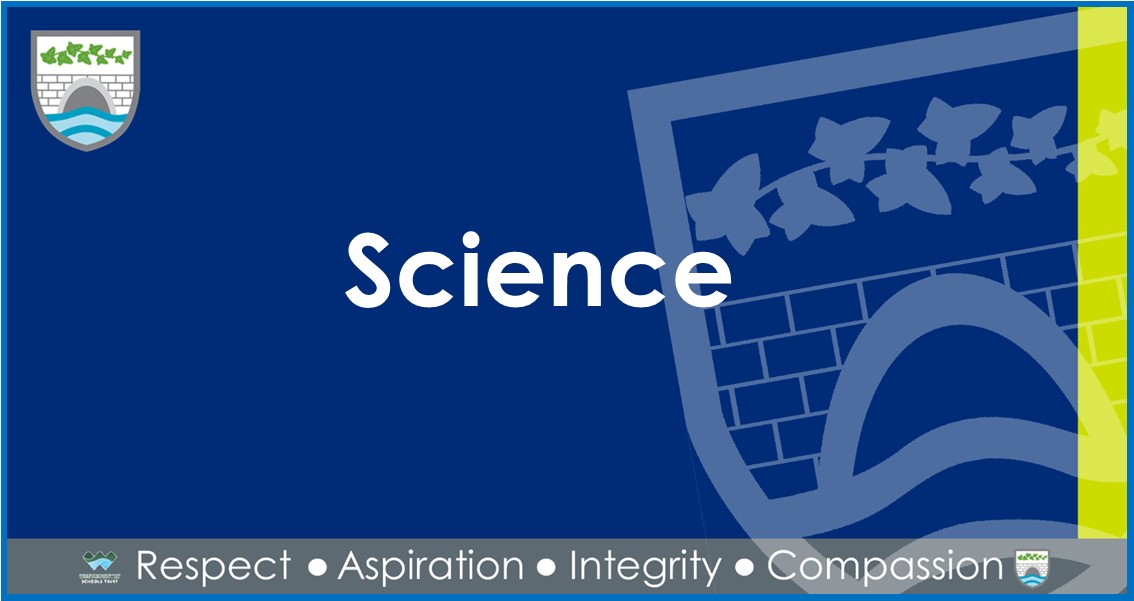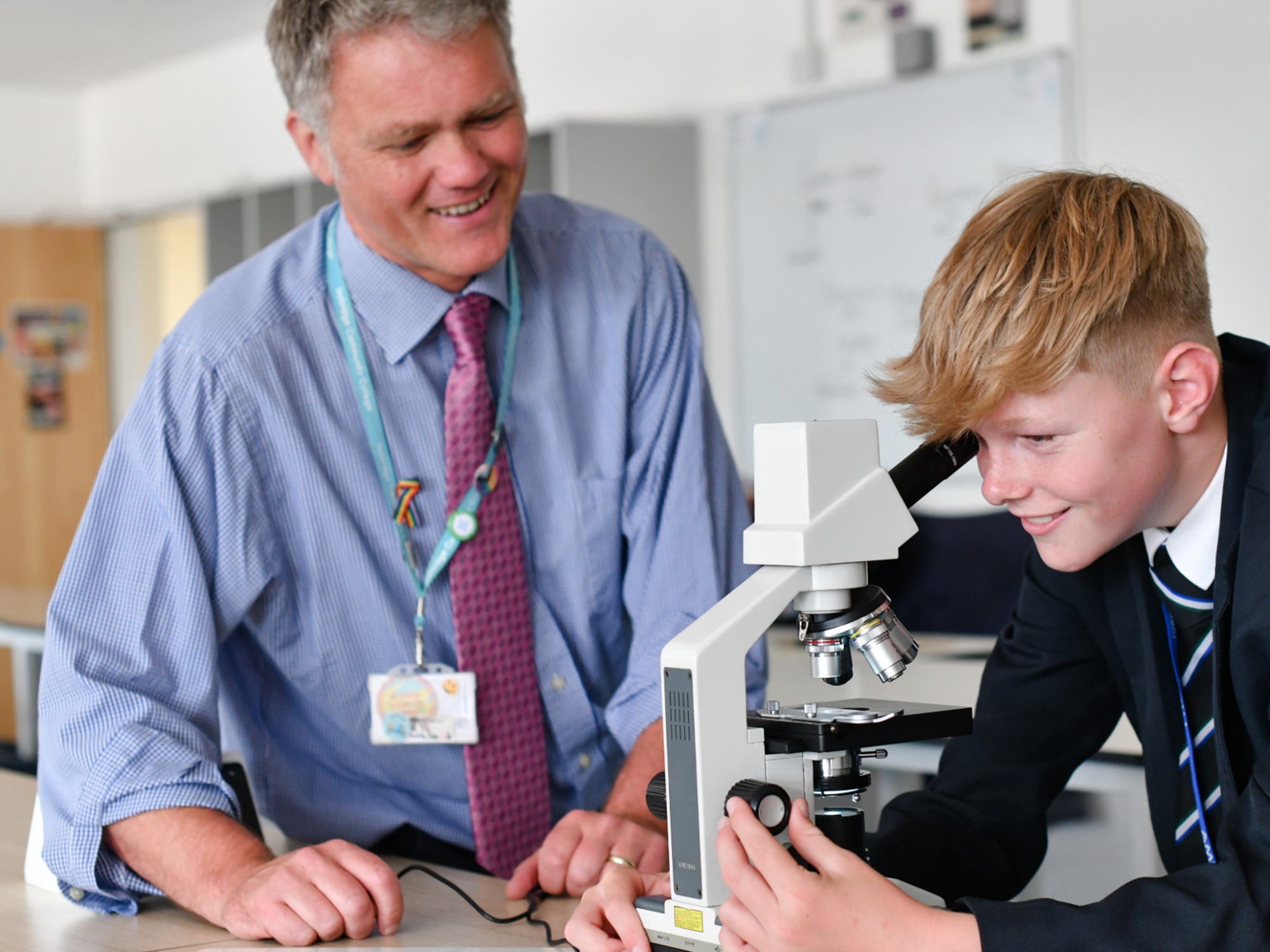Science
Please note: if you are viewing this page on a mobile phone, you may need to view in Landscape in order to view all of the content.


Head of Department: Alan Makeham
Welcome to the Science Department at Ivybridge Community College.
Statement of Intent
The science curriculum prioritises a secure understanding of scientific key knowledge.
We believe that engaging with the world in a scientific way will enable students to make informed decisions based on evidence.
Implementation
We offer a variety of student-centred courses to suit the students who will study them, including Combined Science and Separate Sciences for Years 9-11 and Biology, Chemistry, Physics and Environmental Science for Years 12-13. This allows our students to make the choices they want to make at those levels, but also later in life. We teach the topics in those courses in an order that we feel aids understanding and progression and allows students to develop the skills they need to be able to move on to the next stage.
Our lessons are inspiring and engaging and we use up-to-date models of learning to help our students retain the information. The Science Department worked with the Research Schools Network and the Education Endowment Foundation in 2018-19 to learn about and practice the Self-Testing Toolkit, which uses a series of strategies to promote long term memory, involving interleaving, repetition and self-testing. This is now being used at the whole College level. The Physics teams has formed links with the Institute of Physics, the Royal Institution and the Ogden Trust.
Our lessons are well resourced by our experienced and specialised team. We are supported by a strong team of well-qualified, knowledgeable and proactive Technicians.
Science students at Ivybridge Community College receive a large breadth of enrichment opportunities to encourage a love of Science. They are inspired by our fantastic team of well qualified and passionate staff. We run a Science Enrichment Week package, taking students on Science-based trips and holding in-College Science workshops. Science Week 2024 at Ivybridge Community College focussed on a theme of ‘time’, with many outside speakers in scientific jobs coming in to talk to our students about life in their profession and conduct the kind of practical tasks their career involves.
We are proud of the scientists we are helping to create. Some examples of the scientific courses our Year 13 students left to embark upon are...
Osteopathic Medicine |
Forensic Science |
Chemical Engineering |
Biomedical Science |
Building Surveying |
The Environment |
Medicine |
Aerospace Systems Engineering |
Zoology |
--------
The Director of Science is
Mr Alan Makeham
We have three Deputy Heads of Department...
Ali Bridge
|
Emma Parsons
|
Richard Barry
|
...who each lead a team of specialist teachers.
We have four Assistant Team Leaders...
Jo Wright
|
Ben Stancombe
|
Jon Hargreaves
|
Jon Shellard
|
We also have a well-qualified and experienced team of Science Technicians and a Resource Assistant to support the teaching.
Many of our team hold whole College responsibilities.
--------
Facilities
The Department has twenty-one well-equipped laboratories. Each laboratory is equipped with class sets of a good range of frequently used apparatus items, to facilitate effective practical and investigation work. Every laboratory is equipped with a data projector and whiteboard. Our Science Technicians are based in four Prep Rooms.
Current provision for students also includes a Science Computer Room with a suite of twenty-six full PCs, a laptop trolley and a tablet trolley for use in laboratories, data logging equipment, an optics room, a wildlife pond and a greenhouse.
Science at Key Stages 3 and 4
Our Science Curriculum for Years 7-11
In Science, our Year 7 students begin by studying the most fundamental and updated concepts of Science. All students have seven hours of Science per fortnight in Years 7 and 8, based in our Science laboratories, with the additional use of our computer suite. Year 9 is a foundation GCSE year with 8 hours per fortnight during which students determine if they will follow either our GCSE Combined Science, or our GCSE Separate Sciences AQA course in Years 10 and 11. Both the Combined course and the Separate Sciences course prepare our students well for A-Level.
We build on essential concepts and skills throughout every module to ensure that our students understand why they are learning what they are learning and why each step involved in the planning, implementation and analysis of an experiment are important.
Science at Key Stage 5
Our Science Curriculum for Years 12-13
At Key Stage 5, we offer...
OCR
|
Salters (OCR)
|
OCR
|
AQA
|
We offer many opportunities alongside these courses, to allow our students to put their learning into context and inspire them to consider a career in Science, including field work and university trips. Some examples of the scientific courses our Year 13 students left to embark upon are...
Osteopathic Medicine |
Forensic Science |
Chemical Engineering |
Biomedical Science |
Building Surveying |
The Environment |
Medicine |
Aerospace Systems Engineering |
Zoology |
--------
A Level in Biology A
Cell Structure |
Biological Molecules |
Nucleotides and nucleic acids |
Enzymes |
Biological Membranes |
Exchange Surfaces |
Cell division, diversity
|
Communicable diseases, prevention and immunity |
Transport in Animals |
Transport in Plants |
Biodiversity |
Classification and evolution |
Communication and Excretion |
Nerves and Hormones |
Plant and Animal responses |
Photosynthesis |
Respiration |
Cellular Control |
Patterns of inheritance |
Manipulating Genomes |
Cloning and Biotechnology |
Ecology |
--------
A Level in Chemistry OCR A
Atoms, compounds, molecules and equations |
Acid–base and redox reactions |
Electrons, bonding and structure |
Amount of substance |
Organic Chemistry |
Organic synthesis |
The periodic table and periodicity |
Chromatography and spectroscopy (NMR) |
Group 2 and the halogens |
Polymers |
Carbonyl compounds |
Nitrogen compounds |
Reaction rates and equilibrium |
Analytical techniques (IR and MS) |
Enthalpy, entropy and free energy |
Redox and electrode potentials |
Transition elements Aromatic compounds |
Carboxylic acids and esters |
|
|
Chromatography and spectroscopy (NMR) pH and buffers |
|
--------
A Level Physics (OCR A - H556)
Module 1:
|
Module 2:
|
Module 3:
|
Module 4:
|
Module 5:
|
Module 6:
|
--------
AQA Environmental Science
The Physical Environment |
Energy Resources |
Pollution |
The Living Environment |
Biological Resources |
Sustainability |

